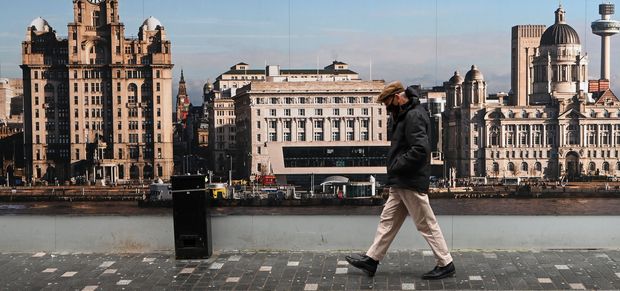
Up to 500,000 people in Liverpool, England, are set to be tested for COVID-19 under the U.K. government’s first trial of citywide mass testing, aimed at curbing the spread of the SARS-CoV-2 virus that causes the disease.
paul ellis/Agence France-Presse/Getty Images
Up to half a million people in Liverpool are to be tested for COVID-19 under the U.K. government’s first trial of citywide mass testing, aimed at curbing the spread of the new coronavirus by identifying as many infected people as possible.
Under the mass testing program, dubbed “Operation Moonshot” — everyone living and working in Liverpool will be offered repeat COVID-19 testing, whether or not they have symptoms, with hundreds of thousands of new, rapid, turnaround tests deployed.
Around 2,000 military personnel will arrive in Liverpool on Thursday to help roll out the program, which starts on Nov. 6. The pilot will involve a mix of existing swab tests and new lateral flow tests, which can provide a result within an hour without the need to use a laboratory.
The Department for Health and Social Care said that the pilot will help inform a blueprint for how mass testing can be achieved to break chains of transmission, and how fast and reliable COVID-19 testing can be delivered at scale.
“These tests will help identify the many thousands of people in the city who don’t have symptoms but can still infect others without knowing,” said Prime Minister Boris Johnson as he announced the pilot program on Tuesday.
If the tests are successful, the government will aim to roll out the pilot to “millions” between now and Christmas, empowering local communities to use them to drive down transmission in their areas.
“It is early days, but this kind of mass testing has the potential to be a powerful new weapon in our fight against COVID-19,” Johnson said.
Liverpool has one of the highest rates of coronavirus infections in England, with weekly COVID cases of 410 in every 100,000 as of Oct. 25.
The pilot comes after the U.K.’s daily testing coronavirus capacity passed the 500,000 mark on Saturday, the government said.
It also comes as the country prepares to enter a second national lockdown on Thursday, before returning to a regional three-tiered system on Dec. 2.
However, the mass testing program will depend on people’s willingness to come forward, and if the government can convince those who are infected with the virus to self-isolate, which may mean that they miss work and pay.
Read: Businesses warn of hit to profits as second U.K. lockdown deals ‘devastating blow’
Some scientists and health professionals have raised questions about “Operation Moonshot,” warning that there are issues with laboratory capacity for current tests and that technology for more rapid tests doesn’t yet exist.
Professor Jonathan Deeks from the Institute of Applied Health Research at the University of Birmingham and colleagues from Leicester and Newcastle Universities called the program “scientifically unsound” in an editorial in the scientific journal The BMJ on Sept. 22.
“Real concern exists that many people who are not infections (and not likely to become infectious) will receive positive test results, and together with their contacts, will be forced to isolate unnecessarily,” they said.
Mass testing and quarantining in the small Italian town of Vo’ enabled the community to suppress the virus in just a few weeks, according to a study led by a scientist at Italy’s Padua University and Imperial College London.
The town went into quarantine immediately after the first death on Feb. 21, during which time most of the 3,275 residents were tested. The study, published in the journal Nature in June, showed that mass testing combined with case isolation and community lockdowns can quickly stop local outbreaks.
Testing of Liverpool’s residents will be carried out in both new and existing sites across the city, including using home kits, in hospitals and care home settings, and schools, universities and workplaces. Some people will be invited for tests by the local authority, but walk-up and online bookings will also be possible.
The tests will use a combination of existing swab tests, as well as new lateral-flow tests that can rapidly turn around results within an hour without the need to be processed in a lab. “LAMP” (loop-mediated isothermal amplification) technology will also be used in Liverpool University Hospitals NHS Foundation Trust for testing National Health Service staff.
Individuals who test positive — and contacts who are required to self-isolate — will be entitled to the £500 Test and Trace Support Payment in the same way as a regular swab test ordered through NHS Test and Trace.
Read: COVID-19 immunity may only last a few months after infection, study indicates
Interim Executive Chair of the National Institute for Health Protection Dido Harding said mass testing would “dramatically enhance” the government’s ability to stop the spread of the virus.
“This first deployment of whole city testing in Liverpool is a really important step forward and is thanks to the big increase in testing capacity and our investment in new testing technologies,” she said.






